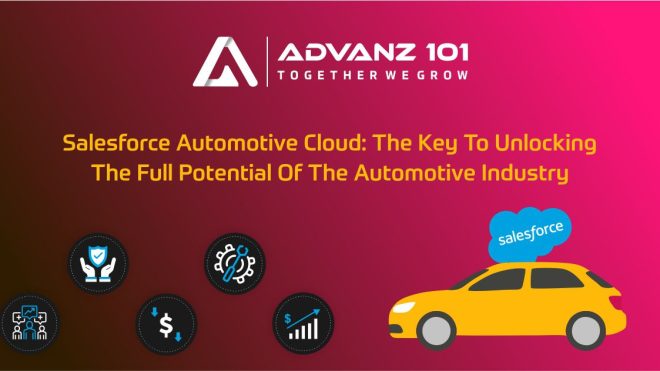The automotive industry is seeing a tremendous surge in the rise of connected vehicles and more intuitive selling models. The given shift has led to an influx of data that companies struggle to capitalize on in a perfect way. Salesforce Automotive Cloud is a new innovative platform that promises to assist critical players in making the most of data produced in the automobile business. Salesforce Automotive Cloud is a dedicated product for the automotive industry, which uses Driver 360 to create a single, real-time view of the entire customer and vehicle lifecycle for automakers, dealers, and automotive finance groups. The given blog will debate about how Automotive Cloud Salesforce transforms automotive industry.
What is Salesforce Automotive Cloud?
Salesforce Automotive Cloud is a new solution with an in-built feature called Driver 360. It focuses on capitalizing on Customer 360 features to give a real-time holistic picture of the vehicle’s lifetime and customer actions. Moreover, it fuses information from various sources to help automotive companies deliver top-notch services and exceptional customer experience. Further, it compiles detailed driver and vehicle profiles to aid in scripting linked events at every stage of the vehicle lifecycles.
Privileges that come with Salesforce Automotive Cloud
Salesforce Automotive Cloud is a game-changer for the automotive industry. It helps companies make the most of the digital realm by providing a single source of truth for the entire customer and vehicle lifecycle. The product offers several benefits, including:
I. Higher Security to Avoid Data Theft
Businesses may enhance fleet safety by tracking vehicle whereabouts and behavior trends with Salesforce Automotive Cloud. Then, firms can utilize data to avoid mishaps or to detect possible dangers early on. Furthermore, it can aid in the enforcement of safety laws.
II. Better Productivity, Revenue, and Customer Loyalty
The recent announcement from Salesforce to include new features will assist automotive companies in increasing productivity, revenue, and customer loyalty. By leveraging AI and automation, the given cloud solution can help these enterprises to streamline their processes and profitably make data-driven decisions.
III. Upgrade Corporate Performance and Predictable Outcomes
The new cloud solution focuses on better management, deeper insights, and more visibility for sales, service, and dealer networks. Because it can organize and handle the information uniformly, it creates a foundation for leveraging Salesforce AI/ML capabilities to accelerate the purchase lifecycle.
IV. A Good Awareness of the Demand
Based on historical behavior, the Salesforce Automotive Cloud permits businesses to forecast how much demand they will require for future items. It will enable automobile firms to guarantee that they are ready for future possibilities for growth.
V. Reduce Expenses and Bigger Profits
By leveraging connected devices, Salesforce Automotive Cloud helps to reduce expenses and enhance profits. What does it convey? It demonstrates how automakers may enhance their business line while offering better consumer satisfaction.
VI. Build the Foundation for Data Monetization
The integration of facts in such a manner to digest them faster, rapidly act upon them, and use them globally permits automobile companies to do something unique creation. What? It is the development of early-stage capabilities for direct-to-consumer channels and the delivery of data monetization opportunities.
Use Cases of Salesforce Automotive Cloud
Salesforce Automotive Cloud has several use cases in the automotive industry. Some of them are as follows:
a. Connected Vehicles
Salesforce Automotive Cloud helps companies provide connected experiences to their customers. It creates an amalgamation of whole driver and vehicle profiles that offers a related background to help customers make better purchasing choices.
b. Sales Process
Salesforce Automotive Cloud emphasizes simplifying the overall sales process of the auto industry. It provides an all-inclusive view of the car lifecycle, which can help companies identify potential customers and offer personalized experiences.
c. Single Data Model
Salesforce Automotive Cloud combines the data model to provide highly relevant micro-experiences regardless of the interaction channel. The data model complies with STAR (Standards for Technology in Automotive Retail), enabling easy integration with third-party market solutions.
d. Link Complex Back & Front-Office Operations
Modern sales and after-sales experiences in new vehicle sales and auto finance involve coordinating many distinct programs, such as mainframe applications and ERP. Salesforce’s Automotive Cloud now includes Digital Process Orchestration [DPA]. It employs a process-oriented approach to integrate disparate systems across many teams, allowing distinct business users to interact as a united team.
Conclusion
Salesforce Automotive Cloud is a game-changer for the automotive industry. It helps companies make the most of the data collected in the sector and provides a single unified source for the entire client and vehicle lifecycle. The product delivers real-time personalization and insights across the whole customer and vehicle lifecycle, which can help companies provide personalized experiences to their customers. Salesforce Automotive Cloud has several use cases in the automotive industry, including connected vehicles, customer service, sales processes, and data management. With Salesforce Automotive Cloud, the automotive industry is witnessing a unique revamp, with cars being more connected than ever. It is also opening more options to create new opportunities for growth and innovation.


